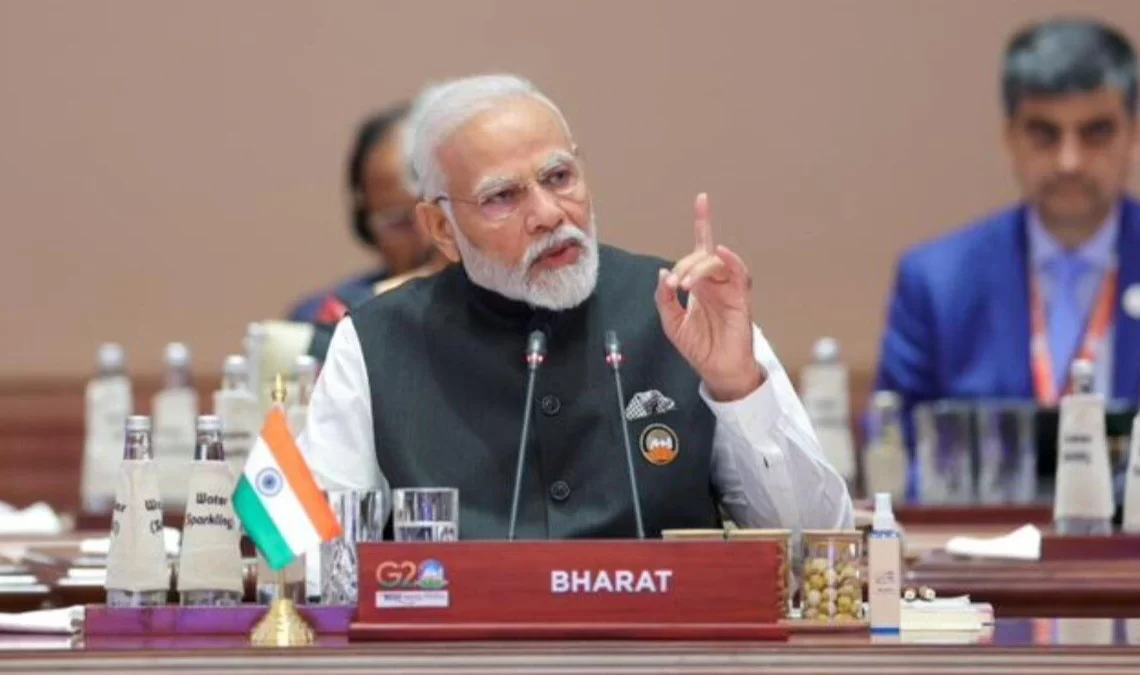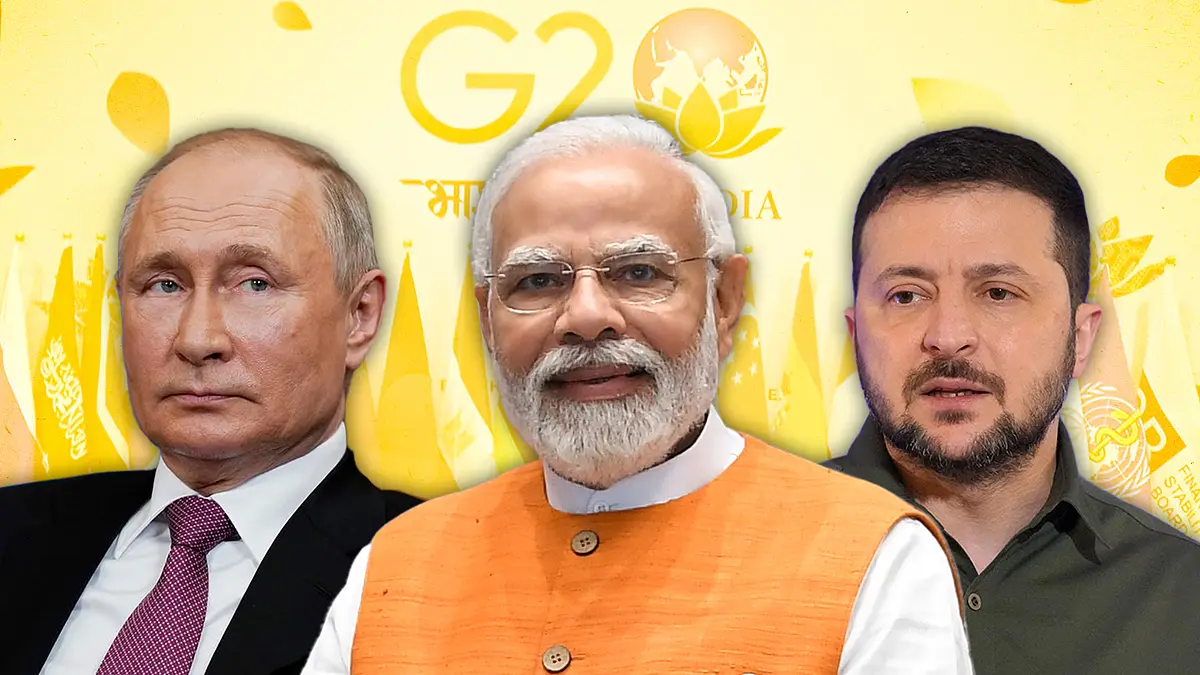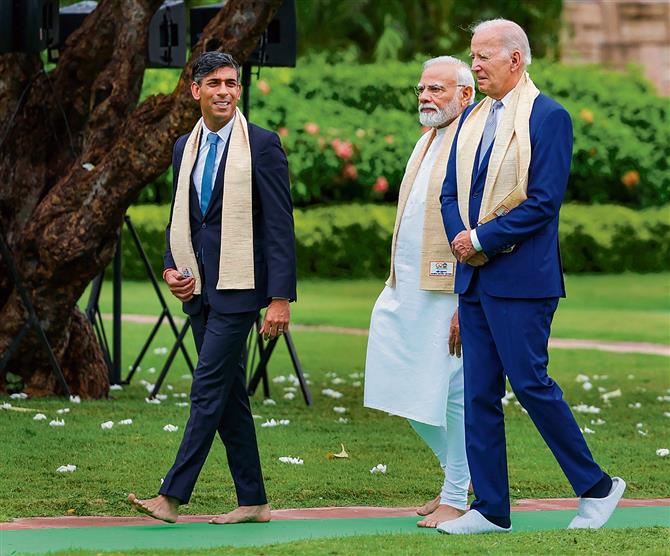
“We are One Earth, One Family and we share one Future,” with these remarks Prime Minister Narendra Modi concluded the G20 Summit under India’s Presidency, here in the national capital. The less than one year saw over 220 meetings being held with thousands of hours of consultations and discussions, finally leading up to the adoption of the New Delhi Declaration. India hosting the summit for the first time made it a defining moment, which was further escalated by the awe-inspiring presentation and preparation by the government for the summit.
Reading between the lines of the Delhi Declaration
The Delhi Declaration consisting of 83 paras and 112 outcomes is one of the largest and ambitious to have come. The biggest achievement of the declaration has no doubt been obtaining a 100% consensus, that too in a world so divisive as that of today. Especially, one can just imagine how tedious a task it would have been to bring about a consensus on an issue like the Russia-Ukraine war. (Yes it’s controversial, but I will come to that later). Also, G20 Sherpa Amitabh Kant said that it took some 200 hours of discussion to bring every side on the same page, just for that one para.
Regarding India’s agenda, it has been quite clear throughout its G20 presidency. PM Modi has been presenting himself as the leader of the Global South and someone who is “giving voice” to the concerns of poor and underdeveloped countries, who were often “ignored” by the developed world. The inclusion of the African Union is a major achievement in the very same direction (I will come into its detail later). Overall, the New Delhi Declaration has tried to give a direction on almost all the issues concerning today’s world from Sustainable Development, multilateral institutions, technological development, women empowerment, international taxation, countering terrorism and creating an inclusive world; everything was right there into it.

Some details and breakdown of the Global Biofuel Alliance (Photo: CivilsDaily)

The graphical depiction of what the India-Middle East-European Economic Corridor might look like (Photo: ForumIAS Blog)
Major Agreements
It is no surprise that when such a large summit of perhaps 20 biggest countries takes place, some major agreements will come. And so was the case this time. But, the two standout agreements of this summit were the Global Biofuel Alliance (GBA) and the India Middle East Europe Economic Corridor (IMEC).
The Global Biofuel Alliance is an initiative to develop an alliance of governments, international organisations and industry to facilitate the adoption of biofuels as a key to energy transition. It aims to offer capacity-building exercises, technical support and promoting policy lessons-sharing to support global development and deployment of sustainable biofuels. GBA further aims to facilitate a virtual marketplace to connect technology providers to end users through industries, countries and eco-systems, in line with the internationally recognised codes and principles. The alliance has been led by India, Brazil and USA, and 19 countries (both G20 and non-G20) and 12 international organisations, have already shown interest in joining it. For India too, it holds many opportunities to accelerate existing biofuel programmes such as – PM-JIVANYojna, SATAT, and GOBARdhan scheme — and achieve its target of Net Zero.
The India Middle East Europe Economic Corridor is a transnational rail and shipping route spread across two continents, which aims to stimulate economic development through improved connectivity and economic integration between Asia, the Arabian Gulf and Europe. If it achieves its objectives, it will create commercial hubs and facilitate the development of clean energy, support trade synergies and will also strengthen food security. The IMEC will include two separate corridors; the East Corridor will connect India to the Arabian Gulf and the Northern Corridor will connect the Arabian Gulf to Europe. Also, quite interestingly, the corridor is being seen by many as a competition to China’s Belt and Road Initiative, which is already infamous for “debt-trapping” poor countries. However, experts say that BRI is already a decade ahead with the galvanisation of over 3000 projects across 150 countries worth $1 trillion.

The historic moment when the African Union was made a permanent member of the G20 (Photo: The New Indian Express)
African Union
The biggest achievement of New Delhi’s presidency, which India can definitely boast for a long long time, is the inclusion of the African Union — a grouping of 55 African nations — as a permanent member of the G20. So, effectively it is a ‘G21’ now, but there has been no statement regarding name change here (phew!). Now, one might have differences with the presidency in many areas, but if under its presidency, India was able to bring upon a whole new member — that too when throughout its inception, no member was added as permanent in G20 — it is undoubtedly a big achievement.
Also, with the inclusion of the African Union, India will more aggressively be able to push for its long-stated stand for reforms in the global multilateral institutions, especially in the United Nations Security Council (UNSC), where it is long demanding a permanent seat. Notably, six new countries were also added in BRICS, a month before. However, since that was not under India’s presidency and China seems the strongest power of the bloc, the African Union’s inclusion is a stronger example for New Delhi to advocate its ‘Leader of the Global South’ image on the world stage.

Language on Russia-Ukraine war has been a hot topic of discussion in global media (Photo: NewsLaundry)
The ‘Language’ of Russia-Ukraine War
Now, let’s bring out the rabbit from the hat. The language of the New Delhi Declaration on the issue of the Russia-Ukraine war. Quite surprisingly even for many experts, the declaration didn’t even mention Russia in the para about the war. Now, from India’s point of view, there is not much of a surprise considering New Delhi’s long relations with Moscow, and its stand throughout this war. While, in the global media from New York Times to the Guardian, the declaration has faced a lot of scrutiny, which has been termed an “eye-opening departure”. More than the declaration, it is their own leaders, from Biden, and Sunak to other Western leaders, who have faced the flak for agreeing on such a soft language on Ukraine, despite supporting Kyiv for over one-and-half years.
On the other hand, it can be said in India’s defence, that the declaration does state that “all states must refrain from the threat or use of force” and also calls any “threat of nuclear force inadmissible”. It also highlights the human suffering and negative impacts of the war especially on the global food and energy security, further calling for the resumption of the Black Sea Grain initiative. Lastly, it calls the member nations to support a “comprehensive, just, and durable peace in Ukraine” reiterating Modi’s earlier remark “Today’s era must not be of war”. Also, India’s response to criticism on not inviting Zelenskyy is also ‘logically sound’ stating G20 is an “economic forum, not a political one”.

The G20 Summit has boosted Mr Modi’s image not just politically but also globally (Photo: Tribune India)
Political Mileage for Modi ahead of 2024
Now, whatever differences, parties might be having regarding India’s G20 presidency, one undoubtedly fact is that it has given a rock-solid mileage to Narendra Modi and his party ahead of the Lok Sabha polls next year. Also, it is no surprise to politically aware people, how master marketeer both Mr Modi and BJP are. They already made the preparations for the G20 as if it is a “festival and blessing” for the country. The outreach was carried out to such an extent that all households, even auto drivers to housemaids were aware of a thing called G20 taking place (No offence was intended in the references, and I hope none was taken).
Also, a notable point here was there was not a very heavy criticism of India’s G20 presidency from the Opposition. Their only complaints were not inviting opposition leaders and placing ‘Bharat’ in place of India just to corner the alliance. And that’s a nice thing because the country should be looked down on as one on matters of global importance. Also, anyone too concerned about India’s language in the declaration on Russia should take note of Rahul Gandhi’s statement who has clearly said that they “almost agree and support” the stand of the Modi government on the issue.
Where is India headed globally?
Irrespective of which section or ideology you come from, it should not be very hard to say that India’s G20 presidency was indeed a success. Hosting such a big summit, at a never-seen-before level, deserves appreciation. However, as I had said earlier too, it was not something earned or won in a battle. India got its presidency as per a cycle, and will probably get it again around 2042-43. The fact that major Western leaders, as well as the arrogant giants China and Russia were all on the same page, deserves appreciation too for diplomacy. The event has given a nice enough shot to Mr Modi’s image globally too.
The only challenge for India globally lies in the China angle, which undoubtedly India finds itself in an uncomfortable situation. Amid repeated incursions at the border and some stupid maps claiming India’s land, only to undermine New Delhi’s Presidency, Xi didn’t come here. As usual, there was no explanation from Beijing, as Xi he had gone all the way to Johannesburg for the BRICS just weeks earlier.
PM Modi has also called for a virtual summit in November (India is President till then) to review the progress made on the major agreements. This was indeed a good idea and might give one more opportunity to India in putting forward its stance. So, as the G20 year has passed I hope the major ideas and takeaways are worked upon and the idea of an “inclusive future” is truly adopted not just as a global stamp but also as a political message in the country.

